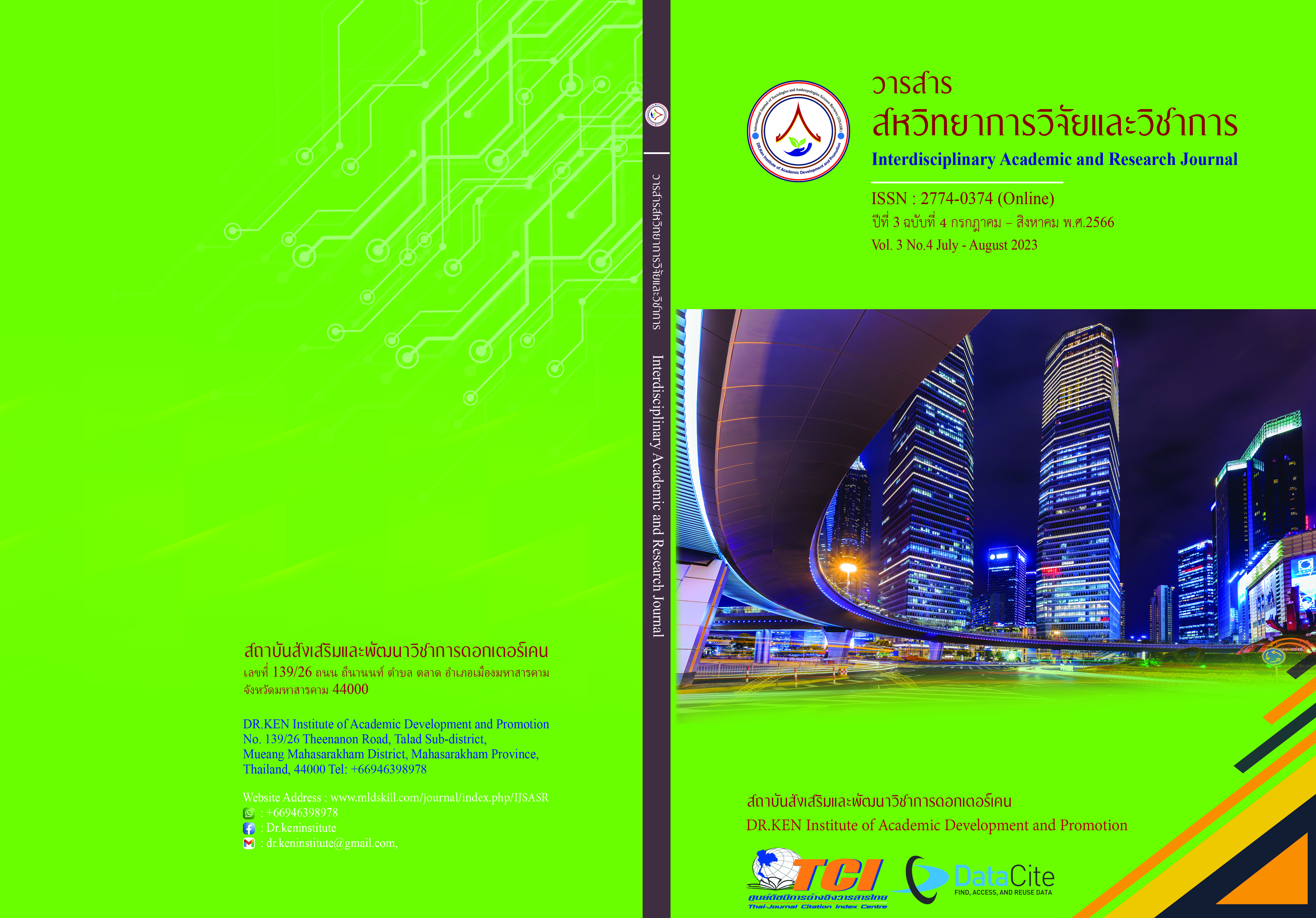Knowledge Management of Local Wisdom on Dulcimer Instruments to Development Life and Career Skills for Students in Thung Fai Subdistrict, Lampang Province
DOI:
https://doi.org/10.14456/iarj.2023.205Keywords:
Knowledge Management; , Dulcimer Instruments; , Development Life and Career Skills; , Local WisdomAbstract
Ban Mae Ta area, Thung Fai Subdistrict, Mueang District, Lampang Province is an area where groups gather to produce Thai musical instruments (Khim), which are unique to the village, and products that create jobs and income for the people of almost every household. The dulcimer-making occupational group was established in 1996 with local sages and dulcimer-making entrepreneurs. It is considered an outstanding and unique area of Lampang Province. This research article aimed to 1) manage local wisdom knowledge of dulcimer musical instruments, 2) promote the learning of local knowledge of dulcimer musical instruments to develop life and career skills for students, and 3) study the satisfaction of students towards learning the local wisdom of the dulcimer musical instrument to develop life and career skills for students in Thung Fai Sub-district, Lampang Province. This research was mixed-method which integrated quantitative Research and qualitative research. Target groups were local wisdom of dulcimer musical sages, Ban Mae Tha’s group of dulcimer entrepreneurs, educational institutions, and students in Thung Fai Subdistrict. The research tools were 1) a questionnaire, 2) an interview form, 3) a survey form, 4) a focus group discussion by collecting information from local sages, a group of dulcimer entrepreneurs and educational personnel in the area, and 5) a satisfaction questionnaire. Statistics for analyzing data were mean, and standard deviation which were presented with a table and description. And the qualitative data analysis was using open-ended questions which were analyzed by content analysis, then analyzed by categorized knowledge about the local knowledge of the dulcimer musical instrument that passed for accuracy from the experts. The results stated that; (1) the knowledge management of local wisdom on dulcimer musical instruments, in conducting knowledge management of local wisdom musical instruments which is a system for seeking knowledge, knowledge creation or innovation, and proper storage of knowledge to increase the efficiency of working knowledge of local knowledge of dulcimer musical instruments. (2) the promotion of learning local wisdom of dulcimer musical instruments can develop life skills and careers for students is a step that brings the knowledge gained from knowledge management of local knowledge of dulcimer musical instruments. designed to develop life and career skills for students. And (3) the satisfaction of the students about learning the local wisdom of the dulcimer musical instrument, it was found that the overall satisfaction was at a high level, and from qualitative analysis, it mentioned that the community can produce dulcimer musical instruments as a career and wants to inherit them to remain alive and also driven by the youth generation in community schools. Suggestions from this research were encouraging and drive in the teaching and learning curriculum to see the value of local wisdom that creates aesthetics for students by playing the community's dulcimer instrument to soothe the mind and pride of the community.
References
กุสุมา พรหมคุณ และอาทิตย์โคชขึง. (2561). การพัฒนาและสืบทอดภูมิปัญญาท้องถิ่น : การจัดการเรียนรู้เพื่อต่อยอดผลิตภัณฑ์การทอเสื่อจากถุงพลาสติกที่เหลือใช้ ด้วยนวัตกรรมใหม่ ระหว่างโรงเรียนสาธิตมหาวิทยาลัยมหาสารคาม (ฝ่ายมัธยม) กับชุมชนอำเภอกันทรวิชัย จังหวัดมหาสารคาม. วารสารพัฒนศิลป์วิชาการ. 2(2), 165-180.
คณะอนุกรรมการการปฏิรูปการเรียนรู้. (2543). ปฏิรูปการเรียนรูผู้เรียนสำคัญที่สุด. กรุงเทพฯ: โรงพิมพ์คุรุสภาลาดพร้าว.
ณวิญ เสริฐผล. (2563). การดำรงอยู่ของภูมิปัญญาท้องถิ่นในสังคมโลกาภิวัตน์. วารสารบัณฑิตแสงโคมคำ. 5(2), 313-331.
ณิชมน ภมร และพัชรี ตันติวิภาวิน. (2563). การจัดการความรู้ภูมิปัญญาท้องถิ่นด้านวัฒนธรรม อาหารพื้นบ้านภาคเหนือตอนบนของไทย. วารสารรังสิตบัณฑิตศึกษาในกลุ่มธุรกิจ และสังคมศาสตร์. 6(2), 28-44
ณิรดา เวชญาลักษณ์. (2559). การพัฒนาผู้เรียนโดยใช้โครงการศึกษาแหล่งเรียนรู้. วารสารบัณฑิตศึกษา. 13(63), 1-10.
บุญชม ศรีสะอาด. (2556). การวิจัยเบื้องต้น. (พิมพ์ครั้งที่ 9). กรุงเทพฯ : สุวีริยาสาส์น.
ประยูร บุญใช้ และภูมิพงศ์ จอมหงส์พิพัฒน์. (2558). การวิจัยและพัฒนาการจัดกระบวนการเรียนรู้แบบบูรณาการโดยใช้แหล่งเรียนรู้ในท้องถิ่นเป็นฐาน สำหรับสถานศึกษาในชุมชนรอบหนองหาร จังหวัดสกลนคร. วารสารบัณฑิตศึกษา. 12(58), 185-194.
ลักษณา เกยุราพันธ์. (2561). รูปแบบการจัดการความรู้ภูมิปัญญาและวัฒนธรรมท้องถิ่น กรณีศึกษา: อำเภอปากพลี จังหวัดนครนายก. วารสารวิจัยและพัฒนา วไลยอลงกรณ์ในพระบรมราชูปถัมภ์. 13(2), 75-85.
สมบัติ สุวรรณพิทักษ์. (2551). พัฒนาหลักสูตรและการเรียนการสอนการศึกษานอกระบบ. กรุงเทพฯ: โรงพิมพ์ชุมนุมสหกรณ์การเกษตรแห่งประเทศไทย.
สำลี รักสุทธี. (2544). เทคนิควิธีการจัดการเรียนการสอนและเขียนแผนการสอน โดยยึดผู้เรียนเป็นสำคัญ. กรุงเทพฯ: พัฒนาศึกษา.
สุชาดา พงศ์กิตติวิบูลย์. (2561). พลวัตการสืบทอดและการผลิตซ้ำสื่อวัฒนธรรม ประเพณีวิ่งควายในยุคโลกาภิวัตน์. วารสารวิชาการ มหาวิทยาลัยราชภัฏพระนคร. 9(2), 45-59.
สุชาดา วงศ์สวาสดิ์ และสุชาฎา คล้ายมณี. (2562). ความพึงพอใจของนักศึกษาต่อการจัดการเรียนรู้โดยใช้แหล่งเรียนรู้ในชุมชนในวิชาพหุวัฒนธรรมและภูมิปัญญาท้องถิ่น. วารสารมหาจุฬานาครทรรศน์. 6(9), 4511-4526.
สุภาพร ลามะให, ทิพาพร สุจารี, พงศ์ธร โพธิ์พูลศักดิ์. (2566). การพัฒนารูปแบบการจัดการเรียนรู้แบบ มีส่วนร่วมของภูมิปัญญาท้องถิ่น เพื่อส่งเสริมทักษะอาชีพของผู้เรียนในสถานศึกษา ในสังกัด สำนักงานเขตพื้นที่การศึกษาประถมศึกษามหาสารคาม เขต 1. วารสารสหวิทยาการวิจัยและวิชาการ. 3(3), 381-400.
สุมาลี สังข์ศรี และพัชราวลัย สังข์ศรี. (2565). การเรียนรู้ตลอดชีวิตสาหรับบุคคลทุกช่วงวัยในสังคมไทย. วารสารมนุษยศาสตร์และสังคมศาสตร์มหาวิทยาลัยธนบุรี. 16(2), 158-170.
อภิชาติ ใจอารีย์. (2557). รูปแบบการจัดการความรู้ภูมิปัญญาท้องถิ่นการแปรรูปหน่อไม้ของชุมชนบ้านพุเตย จังหวัดกาญจนบุรี. วารสารการเมืองการปกครอง. 4(2), 247-285.
อัยนา ภูยุทธานนท์. (2566). การจัดการพื้นที่ด้วยอาหาร “มะตะบะปูยุด” จังหวัดปัตตานี เพื่อพัฒนาอัตลักษณ์ ส่งเสริมคุณค่าและสร้างมูลค่าเพิ่มทางการตลาดไปสู่การสร้างวิสาหกิจชุมชน. วารสารมนุษยศาสตร์และสังคมศาสตร์มหาวิทยาลัยธนบุรี. 17(2), 1-13.
Glaser, B.G., & Strauss, A.L. (1967). The discovery of grounded theory: Strategies for qualitative research.
Merriam, S.B. (1998). Qualitative research and case study applications in education. San Francisco: Josset-Bass.
World Health Organization. (1999). Partners in Life Skills Education. Geneva: WHO.
Downloads
Published
How to Cite
Issue
Section
License
Copyright (c) 2023 Duangjan Kaewkongpan, Waraporn Poommalee, Chisapath Choothong, Siyaphat Senchanthichai, Duangporn Aunjit, Somsak Gatong, Kanokporn Sriwichai, Haruthai Thaisuchat, Pronsawan Maneethong

This work is licensed under a Creative Commons Attribution-NonCommercial-NoDerivatives 4.0 International License.
Copyright on any article in the Interdisciplinary Academic and Research Journal is retained by the author(s) under the under the Creative Commons Attribution-NonCommercial-NoDerivatives 4.0 International License. Permission to use text, content, images, etc. of publication. Any user to read, download, copy, distribute, print, search, or link to the full texts of articles, crawl them for indexing, pass them as data to software, or use them for any other lawful purpose. But do not use it for commercial use or with the intent to benefit any business.
















.png)


